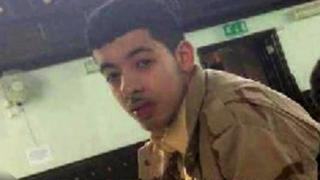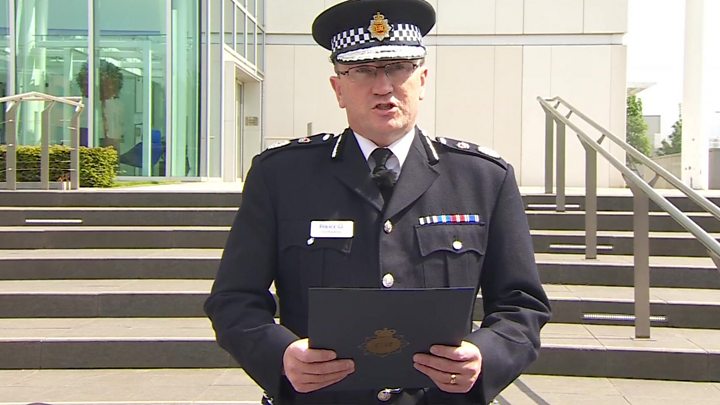
Salman Abedi has been named by police as the Manchester bomber
Police say they are investigating a “network” over Monday night’s attack at Manchester Arena, in which 22 people were killed.
An off-duty policewoman was confirmed by police to be among the victims.
Salman Abedi blew himself up outside an Ariana Grande concert. Four people have been arrested, including the bomber’s 23-year-old brother.
The UK terror threat level is now up to its highest level of “critical”, meaning more attacks may be imminent.
Military personnel are being deployed to protect key sites.
The Palace of Westminster has been closed to the public following police advice, and will not re-open until further notice, its website said.
Home Secretary Amber Rudd said: “[Monday’s attack] was more sophisticated than some of the attacks we’ve seen before, and it seems likely – possible – that he wasn’t doing this on his own.”
BBC security correspondent Frank Gardner said that the bomber is thought to have been a “mule”, using a device built by someone else.
What’s happening with the investigation?

Four people have been arrested since Monday night, including Abedi’s older brother Ismael who was detained in Chorlton, south Manchester, on Tuesday.
Chief Constable Ian Hopkins said: “I think it’s very clear that this is a network that we are investigating.
“And as I’ve said, it continues at a pace. There’s extensive investigations going on and activity taking place across Greater Manchester, as we speak,” he told reporters on Wednesday afternoon.
Police also raided a block of flats near Manchester Piccadilly station in the city centre, requiring them to carry out a controlled explosion and briefly close the railway line.
Anyone with information about the attack can call the anti-terror hotline on 0800 789321.
Who are the victims?
The victims include 14-year-old Sorrell Leczkowski, from Leeds, whose grandmother is critically injured in hospital.
Others who died are Nell Jones, also 14, eight-year-old Saffie Roussos, Alison Howe, Lisa Lees, Jane Tweddle-Taylor, 50, Martyn Hett, 29, and Olivia Campbell, 15, .
Kelly Brewster, 32, John Atkinson, 28, Georgina Callander – thought to be 18 – and Marcin and Angelika Klis, a Polish couple from York, have also been named.
Some of the victims had been making their way outside at the end of the gig when Abedi detonated his “nuts-and-bolts” bomb. Others had been waiting in the foyer to pick up children and family when it went off.
Greater Manchester Police chief constable Ian Hopkins confirmed that a serving police officer – off-duty at the time – was among those killed. He did not give her name.
The BBC understands her husband is critically ill and her two children injured.
Of the 64 injured, 20 are in a critical condition. Twelve of them are known to be children.
Mr Hopkins said the families of all those injured had been contacted.
Due to the number of victims, post-mortem examinations were likely to take between four and five days, he added.
A hotline has been set up for people concerned about loved ones – 0800 096 0095.
Who was the attacker?
Salman Abedi was described by a former classmate as short-tempered and gullible
Salman Abedi is understood to be a 22-year-old born in Manchester to parents of Libyan descent, and a former University of Salford student.
He attended Burnage Academy for Boys in Manchester between 2009-11.
Hamid El-Sayed, who worked for the UN on tackling radicalisation and who now works at the University of Manchester, said Abedi had a “really bad relationship” with his family and his parents had tried but failed to keep him on the “right path”.
“Eventually he was doing very bad at his university, at his education, and he didn’t complete, and they tried to take him back to Libya several times. He had difficulties adjusting to European lifestyle,” he added.
A former classmate of Abedi’s told the BBC that he was a “very jokey lad” but also “very short tempered” and would get angry at “the littlest thing”.
The man, who did not want to be identified, said Abedi was “away at random times throughout the year” but he did not know if he was abroad or playing truant because he hung around “the wrong crowd and was very, very gullible”.
“You could tell him anything and he would pretty much fall for it.”
He said that, before leaving the school in 2011, Abedi became “more and more religious” and that this might explain why he cut ties with former classmates.
What does a ‘critical’ threat level mean?
Image copyright
PA
Soldiers join police officers patrolling in London
Prime Minister Theresa May said soldiers are being placed at Buckingham Palace, Downing Street, embassies and the Palace of Westminster to support armed police in protecting the public.
Military personnel may also be seen at other events over the coming weeks, such as concerts, Mrs May said, in what she is calling a “proportionate and sensible response”.
Mrs Rudd said 984 troops had been deployed in the first instance. Up to 3,800 are available.
She said she expected the raising of the threat level to critical to be temporary, adding that the bomber had been known “up to a point” by the intelligence services.
The highest threat level has only been reached twice before: in 2006 during an operation to stop a plot to blow up transatlantic airliners and a year later when security chiefs were hunting for the men who tried to bomb a London nightclub and attacked Glasgow Airport.
The Metropolitan Police says it has increased its presence across London.
Chelsea Football Club have cancelled their Premier League victory parade, due to take place in London on Sunday.
Elsewhere, extra police officers have been deployed at key sites and on transport networks in Northern Ireland and Police Scotland are reviewing security at major events, including the Scottish Cup Final.
Have you been affected by the events at Manchester Arena? Please email us at haveyoursay@bbc.co.uk
You can also contact us in the following ways:
- WhatsApp: 07555 173285
- Tweet: @BBC_HaveYourSay
- Text an SMS or MMS to 61124
Manchester attack: Police hunt ‘network’ behind bomber

